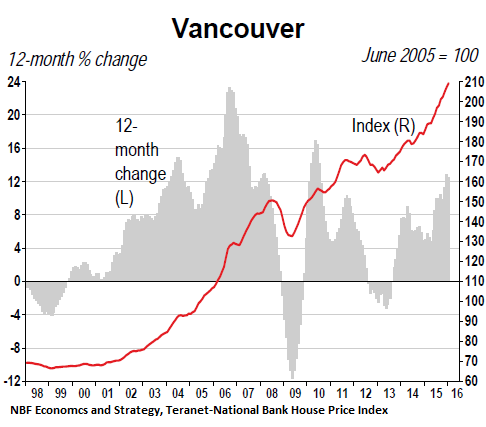Suddenly lurking in the shadow inventory.
The magnificent housing bubble in Canada has been stumbling recently, propped up largely by the two largest cities, Toronto and Vancouver.
Home prices declined 0.1% in January from a month earlier, the second month in a row of declines, according to the Teranet-National Bank National Composite House Price Index. Even Toronto booked a decline of 0.2%. The oil-dependent regions got hit harder. Prices rose only in four of the 11 metro areas in the index. On a 12-month basis, the index was still up only 5.9%, the lowest 12-month gain in three months.
But Vancouver has none of this slow-down rigmarole. Its housing market is booming, with prices up 12.5% year-over-year, beating Toronto’s 12-month gain of 8.5%. Due to their size, they account for well over half of the index.
In Vancouver, prices have now soared 40% from the peak of the bubble just before the Financial Crisis. This chart by NBF Economics and Strategy of the Teranet-National Bank House Price Index shows just how crazy prices have been in Vancouver:

But the price increases might have been even crazier. Depending on methodologies used, “results may vary,” as they say. The Real Estate Board of Greater Vancouver reported that home sales in February jumped 36% from a year ago and were 56% above the 10-year average.
“We’re in a competitive, fast-moving market cycle that favors home sellers,” gushed REBGV president Darcy McLeod. “Sustained home buyer competition is keeping upward pressure on home prices across the region.”
So their benchmark price for all types of homes in Metro Vancouver soared 22.2% year-over-year to C$795,500.
In some of the more expensive neighborhoods, price increases were even higher. For instance, the benchmark price for all types of homes in Vancouver West and West Vancouver soared respectively 24% to C$1.1 million and 26.1% to C$2.25 million.
…click on the above link to read the rest of the article…






 Property auction in Sidney
Property auction in Sidney





